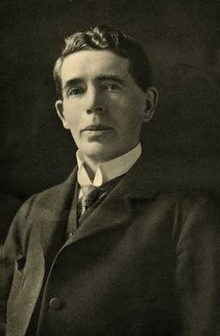約翰·巴格內爾·伯里,FBA(英語:John Bagnell Bury,英國 /ˈbɛrɪ/;1861年10月16日—1927年6月1日)是一名盎格魯愛爾蘭人[1][2],歷史學家、古典學學者、中世紀羅馬歷史學家和語文學家。他曾在其1889年版《羅馬帝國晚期》(Later Roman Empire)的序言中明確反對「拜占庭學家」這一標籤。他曾於1893年至1902年間擔任擔任都柏林三一學院的近代史伊拉斯謨·史密斯教授,此後在1902年起在劍橋大學擔任近代史欽定教授,直至去世。
早期生活與教育
伯里於1861年10月16日在愛爾蘭莫納亨郡的克倫蒂布拉德出生,父親是聖公宗愛爾蘭教會的教區長愛德華·約翰·伯里,母親是安娜·羅傑斯[3]。他一開始由父母教育,之後進入德里的福伊爾大學。後在都柏林三一學院學習古典學,並於1882年畢業。1885年,年僅24歲的伯里成為三一學院研究員。1893年,他被委任成為了近代史伊拉斯謨·史密斯主任,並在該職位上做了九年。1898年成為希臘文欽定教授,同時還兼任歷史學教授一職[4]。1902年成為劍橋大學的歷史學欽定教授。
在劍橋大學,伯里成為史蒂文·朗西曼(中世紀學家)的導師,後者後來評論道,他是伯里「第一個,也是唯一一個學生」。起初,退隱的伯里試圖將其趕走,之後,朗西曼提及他可以讀俄語,伯里於是給了他一堆保加利亞的文章讓其編修,兩人的關係就此開始。伯里成為第一部真正權威的聖博德傳記(1905年出版)的作者。
1901年,伯里獲授格拉斯哥大學法學博士榮譽學位[5];1905年亦獲得了阿伯丁大學法學博士榮譽學位,1902年10月博德利圖書館落成三百年紀念時,獲牛津大學授予的文學博士學位[6]。
伯里一直工作於劍橋,後在65歲拜訪意大利時於羅馬逝世。他被埋葬在羅馬新教徒墓園。
他的弟弟羅伯特·格雷格·伯里,是愛爾蘭的牧師、古典學家、哲學家,以及將柏拉圖和塞克斯圖斯·恩丕里柯作品譯作英文的譯者。
學術貢獻
伯里的著作主題涉及範圍自古希臘起,至19世紀的教皇,內容既具有學術性,又便於外行理解。他關於歷史哲學的兩篇作品闡述了維多利亞時代的進步和理性理想,這些作品奠定了其更為具體的歷史。他還引領了拜占庭史研究的復興(但是他認為,並明確稱之為羅馬史),在愛德華·吉本之後,拜占庭史曾在很大程度上被說英語的歷史學家們忽視。他參與編撰了1911年版的《大英百科全書》,甚至其本人也是其中的一個條目。還和弗蘭克·阿德科克以及S·A·庫克一起編撰了《劍橋古代史》,後在1919年發行。
伯里的生涯表明了他不斷發展的思維過程以及他將歷史作為「科學」的思考[7]。在1902年劍橋大學近代史欽定教授開幕式演講中,他公開宣稱將歷史為一門「科學」而非「文學」的分支。他說道:
| “ |
我或許應該提醒你們,歷史並非文學的分支。歷史的事實,就如同地質或天文學的事實,可以為文學藝術提供素材;由於顯而易見的原因,與自然科學相比,它們更容易進行藝術表現;但是以文學的方式來妝扮人類社會中的故事,不再是身為歷史學家應當做的一部分,而是身為天文學家以藝術形式呈現星星故事的一部分[8][9]。 |
” |
伯里的的演講繼續捍衛歷史不是文學的主張,進而質疑歷史學家在討論歷史事實時是否需要敘事,並從本質上引發了一個問題:敘事是否必要?伯里將他的「科學」與利奧波德·馮·蘭克的科學觀念以及讓使得蘭克觀點成名的德語短語「Ich will nur sagen wie es eigentlich gewesen ist」(我只想敘說它是如何發生的)進行了比較。伯里在演講中的最後重申了他先前的聲明,並用一句話鞏固道:「 ……她(歷史)本身就是一門科學,沒有更少也不會更多」[10]。
在其《思想自由史》(History of Freedom of Thought)的訴諸無知和舉證責任中,他寫道:
| “ | 有人說,除非我們能證明它是錯誤的,否則我們似乎沒有理由拒絕神學教義。但是舉證責任不在於拒絕者……如果你被告知,在某個繞天狼星旋轉的星球上,有一群驢子會說英語,還花了一些時間討論優生學,那麼您無法駁斥這一說法,它關於那個觀點有什麼可信的主張嗎?如果有人經常強有力地去重申它,那麼就會有些人想要接納。[11] | ” |
著作
- A History of the Later Roman Empire from Arcadius to Irene (2 vols.) (1889)[14][15]
- A History of the Roman Empire From its Foundation to the Death of Marcus Aurelius (1893)[16][17]
- A History of the Eastern Roman Empire from the Fall of Irene to the Accession of Basil I (A. D. 802–867) (1912)[18]
- A History of the Later Roman Empire from the Death of Theodosius I to the Death of Justinian (1923)[19]
- The Invasion of Europe by the Barbarians (1928)[20][21]
- The Life of St. Patrick and His Place in History (1905)[22]
- History of the Papacy in the 19th Century (1864–1878) (1930)
參考資料
外部連結
Wikiwand - on
Seamless Wikipedia browsing. On steroids.

